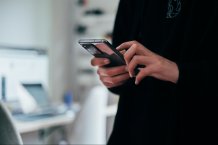Articles

Among those who had a suitable device, the initial decision not to use the app was often associated with social norms
Trust in the UK Government, social norms, and privacy concern associated with uptake of NHS Covid-19 app, study shows
Uptake and continued use of the NHS Covid-19 app last year depended on people’s trust in the UK Government, their concern about privacy, and crucially whether other people in their social networks endorse it, a new study shows.
Among those who had a suitable device, the initial decision not to use the app was often associated with social norms - whether friends or family thought it was a good idea to use the app.
People were also reluctant to use the app due to concern about privacy, which was often fuelled by misinformation about third-party data access. Those who did not use the app were more likely to overestimate the potential for third-party data access including non-health actors such as broadband and telecom providers.
Late adopters by early 2021 were likely to have higher trust in the UK Government. The authors note that this could be related to perceptions about the UK Government’s early success in its vaccination programme.
The study tracks usage of the app at different stages of the pandemic between November 2020 and March 2021.
It was conducted by Laszlo Horvath from Birkbeck College, University of London, Susan Banducci, Oliver James, Daniel Stevens and Katharine Tylerfrom the University of Exeter, Joshua Blamire from the University of Wolverhampton, Cathrine Degnen from Newcastle University and Andrew Jonesfrom University College London, and is published in the journal BMJ Open.
Experts surveyed a representative sample of English residents in July 2020 to get background information, then again in November 2020 to measure their use of the NHS Covid-19 app, and in March 2021 to track their use of the app again.
Initial uptake of the app was 41 per cent, with 12 per cent (124 people) having stopped using it by March 2021. A total of 7 per cent of people (98 people) who hadn’t used it to begin with had started using it by March 2021. Of those not using the app in November 2020 36 per cent reported that they did not own a suitable device, while 1 per cent (16 people) said they were discouraged to use it by their employer.
Dr Horvath said: “We found trust and privacy are key to adoption of the app. Providing clear information to address privacy concerns and tackle misinformation about third-party data access could increase uptake.”
Respondents who had coronavirus were just as likely to be using the app as not using it: 2.39 per cent and 2.71 per cent respectively. By March 2021 people who had the coronavirus were users of the app in only slightly higher proportion than non-users, 3.41 per cent and 2.82 per cent respectively.
Researchers found little evidence that Covid-19 case numbers influenced adoption but initial enthusiasm to adopt the app was higher in urban locations.
Dr Horvath said: “During November 2020 there was a lockdown, so the app would have been used less. At other times the app was used less in places with more local restrictions, making the app less needed for regular use (e.g. venue check-ins). It is important however that those who remained mobile (those who did not work from home) did use the app.”
Date: 18 January 2022
